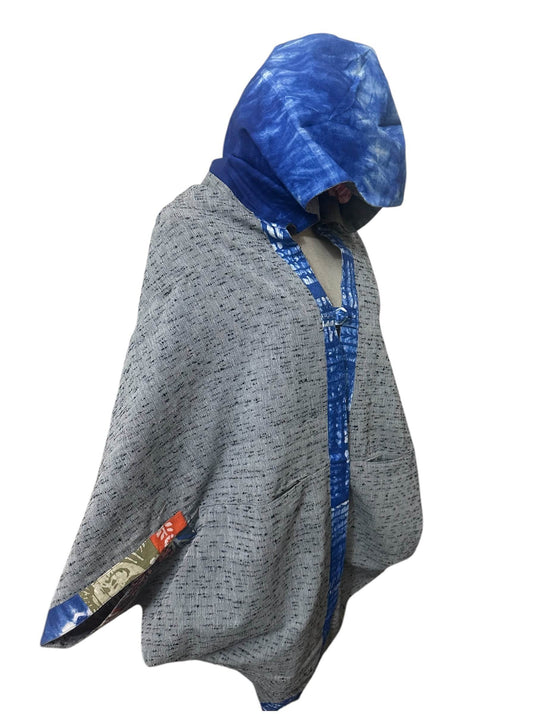One Thousand Poets: A Universe Stitched In Memory

The story of One Thousand Poets doesn’t begin with fabric, sketches, or silhouettes — it begins with a poem.
It was the first anniversary of Iftekhar Noor Shaon’s father’s death. He was sixteen. And without thinking, he picked up a pen. “Looking back, I don’t think it was a particularly good poem,” he says, “but it was the one that got me started.” It wasn’t just grief. It was a door — to self-expression, to stillness, to everything he would eventually create.
What started on a scrap of paper became a brand that’s now one of the most emotionally compelling names to come out of the Arka platform — a space where Noor debuted his first full collection, one made entirely of memory, story, and 15,000 bangles.
A Room of One Thousand
The name One Thousand Poets wasn’t picked for style. It was built from the inside out.
“Poetry was my first creative expression,” Noor says, “and I wanted it to be at the core of my brand’s identity.” But it’s not just about words — it’s about energy. About holding space for those who create with honesty, in any medium.
“I often imagine the energy it would radiate — like sitting in a room filled with a thousand poets, their voices humming in quiet unison.”
His idea of poetry isn’t limited to language. “We find poetry in people, in nature, in a fish, in a bowl, in a single grain of rice — and in God.” That sensitivity — quiet, spiritual, expansive — is stitched into every piece he creates.

From Memory to Matter
Noor doesn’t design from trend forecasts or Pinterest boards. He designs from memory.
The inaugural collection for One Thousand Poets was rooted in childhood — not just abstract nostalgia, but a precise, sensory imprint. “As a child, I loved resting my head on my mother’s arm while we slept. Sometimes, her bangles would make it uncomfortable, leaving imprints on my cheeks by morning.”
That tiny discomfort — that intimate moment — would later inspire an entire world.
His first collection used 15,000 bangles. “It was my most impulsive creative decision,” he says. “And it truly paid off.” The garments shimmered and clinked with history. Some were crafted using the very bangles his mother wore when he was young. One dress bore patterns printed from those bangles, rolled line by line across the fabric by hand. “The patterns were imperfect,” he says, “which made them feel even more genuine.”
On Building Something That Lasts
One Thousand Poets isn’t about seasonal drops — it’s a long story.
“This is a lifelong project for me,” Noor says. “I want to create my own universe — one where my different creative disciplines reference and inspire each other.” He’s not only a fashion designer; he writes, paints, photographs, sculpts. He sees his work as a constellation, a personal map.
“In five years, I want to shape a brand with a clear identity and ideology. One that brings people together and gives back more than it takes.”
I create garments that resonate not only with the body but also the mind.

A Wrinkled Piece of Paper
When asked what material feels most like home to his brand, he doesn’t name silk or khadi or muslin. He says:
“A wrinkled piece of paper.”
That’s what One Thousand Poets is made of — not polish, not perfection. Texture. Honesty. Pages full of thought, not for display, but for transmission. You feel the truth in every crease.
Arka as Catalyst
Noor's debut runway show for One Thousand Poets happened at Arka Fashion Week — a pivotal moment.
“I did my first show through Arka, and it was an amazing experience,” he says. “Many people appreciated my collection after the show, and One Thousand Poets truly became an identity rather than just a name through that experience.”
He sees Arka as more than a platform — he sees it as a signal of what’s possible. “It’s a fresh wave in Bangladesh,” he says. “A youth-centered fashion venture that brings people together to experience something new.”
His brand — and Arka — align in intention: community, experimentation, depth.

Culture, Rewritten
Noor's relationship to culture isn’t static or nostalgic. He doesn’t want to preserve it. He wants to move it.
“Fashion plays one of the most powerful roles in shaping culture,” he says. “But I wouldn’t use the word ‘preserve.’ Contemporary fashion has become a dynamic medium where different eras blend together.”
In his eyes, we live in a remix world — one where no single culture dominates. He thrives in that multiplicity. And he wants Bangladesh to thrive in it, too.
Beyond Labour
Noor is currently studying fashion design in Paris — not to escape Dhaka, but to bring something back.
“It’s my mission for Bangladesh to be known for greater things in fashion,” he says, “not just as the second-largest garment exporter in the world.”
His dream is clear: “We can contribute creatively — not just invest our labour. We just need to stay original, stay rooted in our culture, and give it the right direction.”

Honest Creation
Noor work is deeply personal — so he protects the space he creates from.
“During tough times, I take time off. If I push myself when it’s not the right time, I’m afraid the work I produce won’t be honest.”
And honesty is everything. “One of my favorite pieces was a dress I made using my mother’s bangles. The result was more beautiful than I expected — simple, but full of truth.”
When asked to describe his process in one sentence, he says:
“I take a dive in myself.”
Not Just a Brand. A Thread.
Success, for Noor, isn’t about money or visibility. It’s about resonance. “I hope my audience sees themselves in my creations,” he says. “I want to work with that one thread that goes through us all.”
That thread might begin with memory. Or a poem. Or a single wrinkle in a piece of paper. But in Noor's hands, it becomes a garment — and in that garment, a universe.



